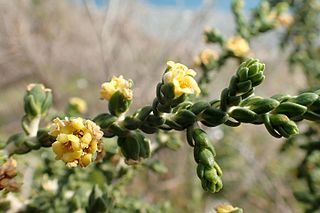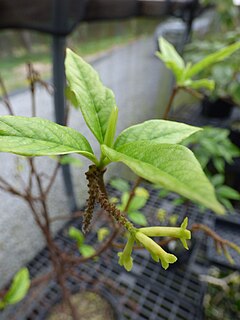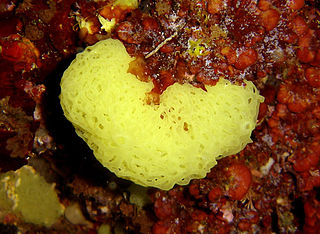
The leatherback sea turtle, sometimes called the lute turtle or leathery turtle or simply the luth, is the largest of all living turtles and is the fourth-heaviest modern reptile behind three crocodilians. It is the only living species in the genus Dermochelys and family Dermochelyidae. It can easily be differentiated from other modern sea turtles by its lack of a bony shell, hence the name. Instead, its carapace is covered by skin and oily flesh.

The Thymelaeaceae are a cosmopolitan family of flowering plants composed of 50 genera and 898 species. It was established in 1789 by Antoine Laurent de Jussieu. The Thymelaeaceae are mostly trees and shrubs, with a few vines and herbaceous plants.

Acacia coriacea, commonly known as river jam, wirewood, desert oak, wiry wattle or dogwood, is a tree in the family Mimosoideae of family Fabaceae. Indigenous Australians know the plant as Gunandru.

Wikstroemia is a genus of 55-70 species of flowering shrubs and small trees in the mezereon family, Thymelaeaceae. Hawaiian species are known by the common name ‘ākia.

Wikstroemia oahuensis, the ʻĀkia or Oʻahu false ohelo, is a species of flowering shrub in the mezereon family, Thymelaeaceae, that is endemic to Hawaiʻi.

Senna artemisioides, the wormwood senna, is a species of flowering plant in the pea family Fabaceae. It is endemic to Australia, where it is found in all mainland states and territories. Other common names include silver senna, silver cassia or feathery cassia - although "cassia" generally refers to the largest-growing Cassiinae. Some of its distinct subspecies also have common names of their own.

Faurea is a genus containing 15 species of flowering plants in the protea family which occur in the summer rainfall area of southern Africa, extending to tropical Africa and Madagascar. The name honours South African soldier and botanist William Caldwell Faure (1822-1844) who was killed on active service in India.
Wikstroemia bicornuta, the alpine false ohelo, is a species of flowering plant in the mezereon family, Thymelaeaceae, that is endemic to Hawaii. It inhabits mixed mesic and wet forests at elevations of 900–1,050 m (2,950–3,440 ft) on the islands of Lānaʻi and Maui. It is threatened by habitat loss.
Wikstroemia skottsbergiana is a species of flowering plant in the Thymelaeaceae family. It is endemic to the island of Kauaʻi in Hawaiʻi, but its range has been severely reduced due to habitat loss. Only one small population of 30 individuals is known, but access to this location has not been permitted to conservationists since 2000, and the habitat surrounding this area has become heavily degraded over the years, raising fears that it may be extinct.

Wikstroemia villosa, the hairy wikstroemia or hairy false ohelo, is a tropical species of plant in the Thymelaeaceae family.
Posidonia coriacea is a species of seagrass that occurs in the southern waters of Australia.

Ilex coriacea, sometimes known as large gallberry or sweet gallberry, is a shrub in the Holly family native to coastal areas in the United States from Virginia to Texas. It exists primarily as an understory plant in pine forests, and is sometimes stimulated by regular controlled burnings.

Clathrina clathrus is a species of calcareous sponge belonging to the family Clathrinidae.

Hyposmocoma chilonella is a species of moth of the family Cosmopterigidae. It was first described by Lord Walsingham in 1907. It is endemic to the Hawaiian islands of Kauai, Oahu, Maui, Molokai and Hawaii.

Gampi or Ganpi are a group of Japanese shrubs, members of the genus Wikstroemia, some of which have been used for making paper since the 8th century. It is used to make the high quality washi paper, as are kōzo and mitsumata trees.
Grevillea coriacea, commonly known as the fine-leafed beefwood, is a shrub native to Queensland.

Persoonia coriacea, commonly known as the leathery-leaf persoonia, is a species of flowering plant in the family Proteaceae and is endemic to the south-west of Western Australia. It is an erect to spreading shrub with smooth bark, spatula-shaped or elliptic to linear leaves and bright yellow flowers borne in groups of up to ten along a rachis up to 70 mm (2.8 in) long.
Wikstroemia johnplewsii, common name Hiva Oa ohelo, is a plant species endemic to the island of Hiva Oa in the Marquesas Islands, French Polynesia. It is found at relatively high altitudes in the mountains, at elevations over 600 m. The only other member of the genus reported from the Marquesas is W. coriacea. Wikstroemia coriacea has narrower leaves and smaller inflorescences than. W. johnplewsii.

Protea punctata, also known as the water sugarbush or water white sugarbush, is a shrub belonging to the genus Protea which is found growing in the wild in South Africa.














